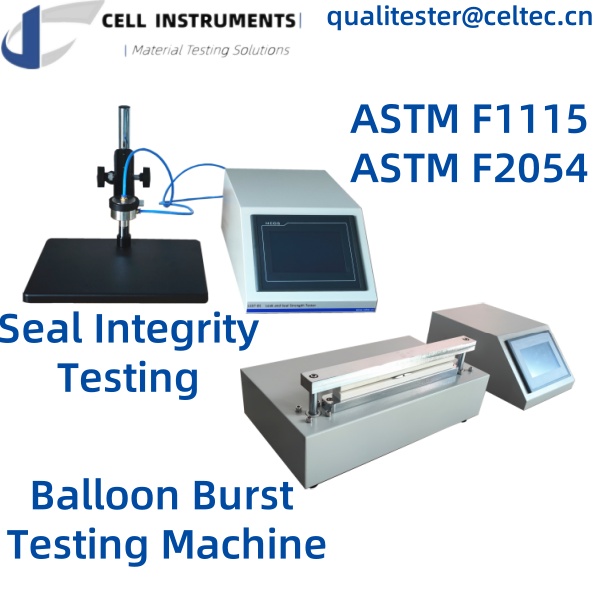Introduction to Balloon Burst Testing
Balloon burst testing is a critical procedure in the evaluation of packaging materials. This test method measures the burst strength of packaging by inflating it until it bursts. This is essential in industries such as pharmaceuticals, food and beverages, and medical devices, where the integrity of the packaging must be maintained to ensure product safety and quality.
The Importance of Seal Integrity Testing in Flexible Packaging
Seal integrity testing is vital for flexible packaging as it ensures that the seals can withstand internal pressure and environmental factors without failing. A robust seal ensures that the contents remain protected from contamination and spoilage, which is particularly crucial in the food, medical, and pharmaceutical industries.
The Role of ASTM Standards
Compliance with ASTM standards, such as ASTM F1140 and ASTM F2054, enhances the credibility and reliability of the testing process. These standards provide detailed procedures for conducting balloon burst tests, ensuring that the results are consistent and reliable.
ASTM F1140
ASTM F1140 outlines the methods for internal pressurization failure resistance of unrestrained packages. This involves inflating the package until it bursts and recording the burst pressure and volume. Compliance with ASTM F1140 ensures that packaging materials can withstand internal pressures during handling and storage, maintaining their integrity and protecting the contents.
ASTM F2054
ASTM F2054 specifies the method for burst testing flexible package seals using internal air pressurization within restraining plates. This standard is crucial for assessing the strength of seals in flexible packaging, ensuring they can maintain integrity under various conditions.
Technical Specifications and Features of Balloon Burst Testers
A Balloon Burst Tester, such as the LSST-01 from Cell Instruments, is designed to measure the burst strength of various packaging materials with high precision and reliability.
- PLC-Controlled Unit: Ensures industrial-level stability and precise control.
- User-Friendly HMI Touch Screen: Simplifies operation and reduces training time.
- Automatic Test Result Statistics and Storage: Enhances efficiency and data management.
- Compatibility with Various Fixtures: Allows testing of different package forms, including three-side-seal packages, closed packages, doy packs, tubes, sealed trays, and cups.
- Three Test Modes: Burst, creep, and creep to failure, catering to diverse testing requirements.
- Personalized Sensitivity and Threshold Settings: Enables customization for specific testing needs.
- Pressure Range Up to 600 KPa: Customizable to meet unique testing specifications.
- Customizable Programming: Provides flexibility to adapt to specific testing protocols.
Advantages of Using Balloon Burst Testers
Precision and Reliability
- High Accuracy in Measurements: Ensures precise and reliable burst strength data.
- Consistent and Repeatable Results: Provides confidence in test results and material performance evaluation.
Versatility
- Suitable for a Wide Range of Materials and Packaging Types: Accommodates various testing requirements across different industries.
- Adjustable Test Parameters for Different Testing Requirements: Offers flexibility in testing diverse materials and packages.
Ease of Use
- Intuitive Software Interface: Simplifies operation and reduces the learning curve.
- Minimal Training Required for Operators: Enhances usability and efficiency.
Compliance
- Meets ASTM F1140 and ASTM F2054 Standards: Ensures adherence to industry standards and regulations.
- Ensures Compliance with Industry Regulations and Quality Standards: Guarantees the reliability and integrity of test results.
FAQ about Balloon Burst Testing
1. What is balloon burst testing?
- Balloon burst testing is a method to evaluate the burst strength of packaging by inflating it until it bursts, measuring the pressure and volume at which the burst occurs.
2. Why is seal integrity testing important for flexible packaging?
- Seal integrity testing ensures that the seals can withstand internal pressure and environmental factors, maintaining the protection of the contents from contamination and spoilage.
3. What are ASTM F1140 and ASTM F2054 standards?
- ASTM F1140 outlines methods for internal pressurization failure resistance of unrestrained packages, while ASTM F2054 specifies the method for burst testing flexible package seals using internal air pressurization within restraining plates.
4. What are the main features of the LSST-01 Balloon Burst Tester?
- The LSST-01 features a PLC-controlled unit, user-friendly HMI touch screen, automatic test result statistics and storage, compatibility with various fixtures, three test modes, personalized sensitivity and threshold settings, and a pressure range up to 600 KPa.
5. How does balloon burst testing benefit industries such as pharmaceuticals and food packaging?
- Balloon burst testing ensures that packaging can withstand internal pressures during handling and storage, maintaining integrity and protecting the contents, which is crucial for the safety and quality of pharmaceutical and food products.


